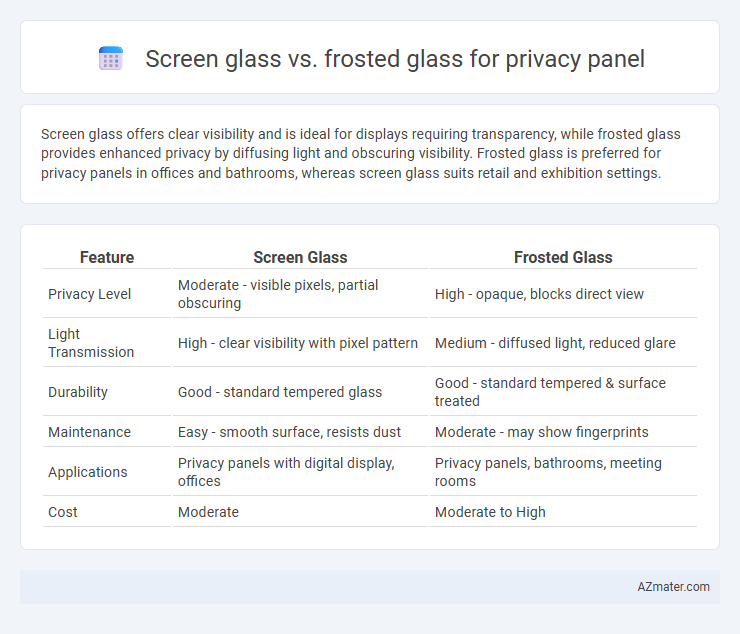Screen glass offers clear visibility and is ideal for displays requiring transparency, while frosted glass provides enhanced privacy by diffusing light and obscuring visibility. Frosted glass is preferred for privacy panels in offices and bathrooms, whereas screen glass suits retail and exhibition settings.
Table of Comparison
| Feature | Screen Glass | Frosted Glass |
|---|---|---|
| Privacy Level | Moderate - visible pixels, partial obscuring | High - opaque, blocks direct view |
| Light Transmission | High - clear visibility with pixel pattern | Medium - diffused light, reduced glare |
| Durability | Good - standard tempered glass | Good - standard tempered & surface treated |
| Maintenance | Easy - smooth surface, resists dust | Moderate - may show fingerprints |
| Applications | Privacy panels with digital display, offices | Privacy panels, bathrooms, meeting rooms |
| Cost | Moderate | Moderate to High |
Understanding Screen Glass and Frosted Glass
Screen glass features a clear, transparent surface often combined with a fine mesh or screen pattern, allowing visibility while reducing glare and providing moderate privacy. Frosted glass undergoes an acid etching or sandblasting process that creates a translucent, matte finish, effectively obscuring visibility while allowing light to diffuse through. For privacy panels, frosted glass offers superior visual concealment compared to screen glass, making it ideal for spaces requiring maximum privacy without sacrificing natural light.
Privacy Levels: Screen Glass vs Frosted Glass
Screen glass provides moderate privacy by allowing visibility through the panel while slightly obscuring details, making it suitable for areas requiring light filtration without complete concealment. Frosted glass offers high privacy levels by diffusing light and significantly blurring visibility, effectively preventing clear views and enhancing discretion in sensitive spaces. Choosing between screen glass and frosted glass depends on the desired balance between natural light transmission and privacy requirements for the specific environment.
Light Transmission Comparison
Screen glass provides higher light transmission, allowing more natural light to pass through while maintaining basic visibility. Frosted glass diffuses light, reducing glare and enhancing privacy by obscuring clear views, but it transmits less light overall compared to screen glass. The choice depends on the desired balance between maximum light entry and privacy requirements.
Aesthetic Differences Explained
Screen glass offers a clear, transparent aesthetic that emphasizes sleekness and modernity, allowing visibility and an open feel in privacy panels. Frosted glass provides a translucent, matte finish that diffuses light softly while obscuring views, creating a more subtle and elegant appearance. The choice impacts ambiance, with screen glass favoring minimalism and frosted glass delivering a delicate balance between privacy and decorative appeal.
Durability and Maintenance Factors
Screen glass offers superior durability with high resistance to scratches and impact, making it ideal for long-term use in privacy panels. Frosted glass, while providing obscured visibility for privacy, is more prone to surface scratches and may require frequent cleaning to maintain its appearance. Maintenance of screen glass typically involves simple wiping, whereas frosted glass often demands specialized cleaners to prevent damage to its textured surface.
Cost Analysis: Which is More Affordable?
Screen glass typically costs less than frosted glass due to simpler manufacturing processes and lower material expenses, making it a budget-friendly option for privacy panels. Frosted glass involves etching or sandblasting techniques that increase production costs, resulting in a higher price per square foot. For large-scale installations, the cost difference becomes more significant, with screen glass offering better affordability while still providing privacy.
Installation Process and Flexibility
Screen glass for privacy panels offers a straightforward installation process, often involving simple mounting brackets or frames compatible with various wall types, enhancing ease and speed. Frosted glass requires precise measurement and handling due to its polished finish, with installation demanding careful alignment to maintain aesthetic consistency and maximize privacy. The flexibility of screen glass allows for easier retrofitting and customization, while frosted glass panels provide rigid privacy solutions better suited for permanent or high-end interior designs.
Suitable Applications for Each Type
Screen glass is ideal for settings requiring clear visibility combined with basic privacy, such as office partitions and retail display cases, where transparency and light transmission are essential. Frosted glass offers enhanced privacy by diffusing light and obscuring shapes, making it suitable for bathroom windows, conference rooms, and private residential spaces. Both types balance privacy and aesthetics, but frosted glass excels in areas demanding greater discretion and limited visibility.
Sound Insulation and Comfort
Screen glass offers moderate sound insulation by reducing noise transmission through its solid, clear surface, making it suitable for environments requiring visual transparency with basic acoustic privacy. Frosted glass enhances comfort by scattering light and providing diffused visuals, while its thickness and textured surface improve sound absorption, leading to better noise reduction compared to clear screen glass. Both materials balance privacy and comfort, but frosted glass typically delivers superior sound insulation for privacy panels in office or residential settings.
Choosing the Right Glass for Your Privacy Panel
Screen glass offers clear visibility while providing basic privacy by reducing direct line of sight, making it ideal for areas where light transmission is important without full exposure. Frosted glass obscures vision with a textured, opaque surface, ensuring maximum privacy by diffusing light and preventing clear views through the panel. Selecting between screen glass and frosted glass for your privacy panel depends on the desired balance between light, visibility, and privacy level required for the specific space.

Infographic: Screen glass vs Frosted glass for Privacy panel
 azmater.com
azmater.com